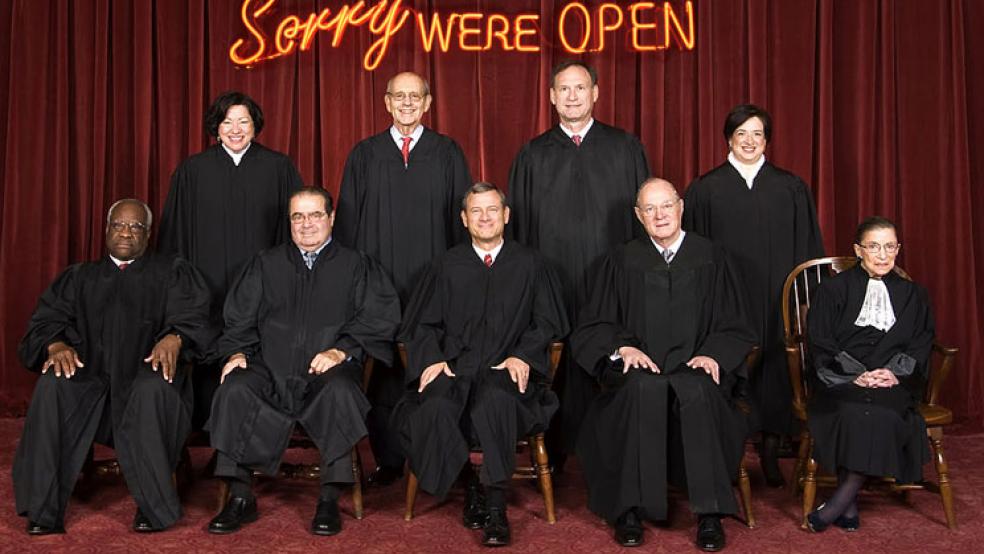There is growing insistence among hardline conservatives that if Hillary Clinton is elected president, the Republican blockade against Democratically-appointed Supreme Court justices must be continued indefinitely. But as ardently as its supporters call for such a “total war” approach, there’s every reason to believe the gambit would fail.
The strategy, which has been percolating on the right for some time, came into public view last month when Arizona Sen. John McCain suggested that the Senate, which has refused to allow President Obama to fill the seat left empty by the death of Justice Antonin Scalia, ought to continue blocking nominees throughout a Clinton administration.
Related: Another Sign This Election Is Driving People Crazy
McCain had an aide walk back his claim. But it was quickly adopted by others, like Texas Sen. Ted Cruz and North Carolina Sen. Richard Burr. Senate Majority Leader Mitch McConnell, who led the move to block consideration of President Obama’s nominee, Merrick Garland, was noncommittal on the issue before leaving Washington for the election recess.
Other influential voices have now joined the chorus. A scholar at the Cato Institute last week insisted that the senate would be within its rights “to let the Supreme Court die out, literally.”
The influential lobbying group Heritage Action for America has called for a total blockade on nominees from a Democratic president for at least the next four years if Clinton takes the White House. “You’ve seen John McCain and others talk about the need to not confirm any liberal nominated to the Supreme Court,” the group’s vice president for communications and government relations, Dean Holler, said in a briefing Thursday. “That’s exactly the right position to have.”
The issue is particularly important to conservatives like Holler because the death of Scalia deprived the court of what was effectively a moderately conservative majority. The appointment of even a single judge who isn’t a strong conservative would decisively shift the balance of the court decisively to the left.
Related: What Happens If Trump v. Clinton Ends in an Electoral College Tie?
Holler added, “It’s perfectly within the realm of Republican senators’ rights and prerogatives and within the Constitution and what they campaigned on to say ‘this person will not uphold the Constitution and therefore they don’t deserve to be appointed to the bench.’”
The thing is, the Democrats appear poised to take control of the Senate, and if they do, Holler and the senators he’ll be trying to persuade all know what will happen if the new majority is met with obstruction of a President Clinton’s Supreme Court picks. Two years ago, when Democrats grew frustrated with perpetual opposition to Obama’s judicial picks, they voted to change the chamber’s rules to bar the filibuster of presidential nominees.
The ban didn’t extend to the Supreme Court, but there is little doubt that in a new Democratically-controlled Congress, leaders would reinstate the ban and extend it to the high court. Basically, whether Republicans like it or not, a new Democratic president with a newly Democratic Senate is going to get the justice she wants.
It’s possible, of course, that the conservatives calling for the blockade are playing a longer game. It could be that they understand the futility of opposition if the Senate flips, and want to force the Democrats to ram a nominee through the confirmation process with a rule change in order to cast doubt on the legitimacy of the newly liberal court’s decisions.
Related: Whether It’s Clinton or Trump, the Next President Will Face This Financial Trap
However, there’s a real likelihood that it won’t come to that in the end, because an indefinite halt to all Supreme Court nominees may be a bridge too far for many Republicans in the Senate. If the Democrats take the majority, it likely won’t be a large one, but they still wouldn’t need too many Republicans -- perhaps six or eight -- to create a veto-proof majority in favor of ending debate on a nomination and calling a vote.
There are already several GOP senators on the record saying that they aren’t interested in perpetuating their stance on Garland through four more years.
“You just can’t do that,” Sen. Jeff Flake of Arizona told The New York Times. “You shouldn’t and you can’t. People expect to have a full court.” Others, including Maine’s Susan Collins, South Carolina’s Lindsey Graham, and even Iowa’s Chuck Grassley, the Senate Judiciary Committee chair who has stood firm in the face of opposition to his refusal to give Garland a hearing, have expressed similar opinions.
And even if conservatives did force the Democrats to change the Senate rules again, it’s not clear that there would be any serious question about the court’s legitimacy in the aftermath, except perhaps for a small faction within the party,.
Related: Trump Tries to Poke Holes in a Solid Jobs Report
Conservative Ilya Somin, a professor of law at George Mason University, said in an interview that while a rule change would anger Republicans, there’s nothing illegal or unconstitutional about it.
“No one doubts the senate has the ability to abolish the filibuster,” he said. Additionally, he added, nobody questions the legitimacy of the judges who were approved after the Democrats changed the rules the first time.
For that reason, he said, he isn’t expecting a serious Republican effort to block Supreme Court nominees if the Democrats control both the White House and the Senate. “I’m not sure there’s value to adopting a strategy that, with a Democratic senate, would fail,” he said.
“By far the more interesting scenario is if the Republicans have control of the senate,” he mused.
“If they were united,” he said, they could easily block Clinton nominees for years at a time. “There’s nothing unconstitutional about that.”





